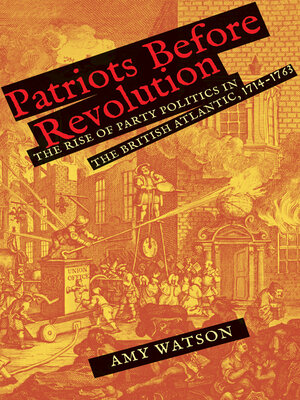Patriots Before Revolution
ebook ∣ The Rise of Party Politics in the British Atlantic, 1714-1763 · The Lewis Walpole in Eighteenth-Century Culture and History
By Amy Watson

Sign up to save your library
With an OverDrive account, you can save your favorite libraries for at-a-glance information about availability. Find out more about OverDrive accounts.
Find this title in Libby, the library reading app by OverDrive.



Search for a digital library with this title
Title found at these libraries:
| Library Name | Distance |
|---|---|
| Loading... |
A new history of the Patriot movement before the American Revolution, tracing its origins to reform movements in British politics
The American revolutionaries—George Washington, Thomas Jefferson, John and Abigail Adams—called themselves Patriots. But what exactly did it mean to be a Patriot? Historian Amy Watson locates the origins of Patriotism in British politics of the early eighteenth century, showing that the label “Patriot” was first adopted by a network of British politicians with radical ideas about the principles and purpose of the British Empire. The early Patriots’ ideological mission was not American independence but, rather, imperial reform: Patriots sought to create a British Empire that was militant, expansionist, confederal, and free.
Over the course of the next half century, these British reformers used print media and grassroots mobilization efforts to build an empire-wide political party with adherents in London, Edinburgh, New York City, and the new colony of Georgia. While building this party, the Patriots’ advocacy drew Britons into a series of violent political conflicts over taxes and civil liberty, as well as three expansive global wars, the War of Jenkins’ Ear (1739–48), the War of the Austrian Succession (1740–48), and the Seven Years’ War (1756–63). Patriot ideas and organizations came to divide Britons on increasingly sharp political lines, laying the groundwork for the revolutionary decades to come.
The American revolutionaries—George Washington, Thomas Jefferson, John and Abigail Adams—called themselves Patriots. But what exactly did it mean to be a Patriot? Historian Amy Watson locates the origins of Patriotism in British politics of the early eighteenth century, showing that the label “Patriot” was first adopted by a network of British politicians with radical ideas about the principles and purpose of the British Empire. The early Patriots’ ideological mission was not American independence but, rather, imperial reform: Patriots sought to create a British Empire that was militant, expansionist, confederal, and free.
Over the course of the next half century, these British reformers used print media and grassroots mobilization efforts to build an empire-wide political party with adherents in London, Edinburgh, New York City, and the new colony of Georgia. While building this party, the Patriots’ advocacy drew Britons into a series of violent political conflicts over taxes and civil liberty, as well as three expansive global wars, the War of Jenkins’ Ear (1739–48), the War of the Austrian Succession (1740–48), and the Seven Years’ War (1756–63). Patriot ideas and organizations came to divide Britons on increasingly sharp political lines, laying the groundwork for the revolutionary decades to come.







